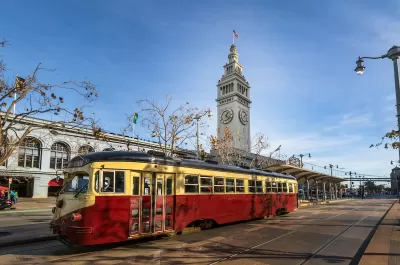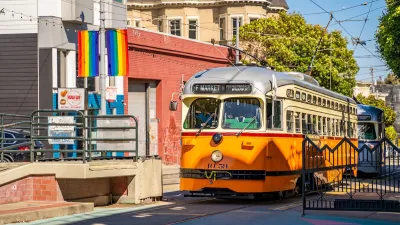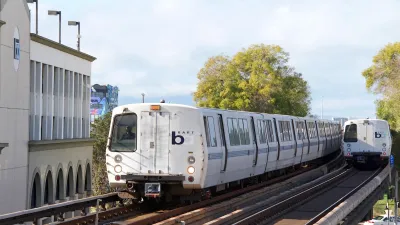Voters in Northern California indicated support for higher taxes on the wealthy and big companies, rejecting increased property or sales taxes to support transportation projects.

Residents of the San Francisco Bay Area say they want the wealthiest residents and companies to pay for better public transit in the region, reports Ethan Baron in The Mercury News.
A poll taken in the region found that “Nearly six out of 10 poll respondents said they would support holding a future Bay Area-wide ballot measure that would hike income tax on high earners to pay for an affordable, coordinated network of bus, rail and ferry lines, and improved roads and pedestrian and cycling infrastructure.”
Respondents indicated they would support boosting transit funding through a 1 percent tax on people making more than $300,000 a year and higher payroll taxes on employers with over $4 million in annual revenue. However, “nearly half of all respondents wanted local officials to focus on improving roads and highways, while just under 40% wanted a focus on better transit.” Voters also ‘strongly rejected’ increasing sales or property taxes to fund transportation.
A proposed bill, SB 925, would allow the Metropolitan Transportation Commission to propose funding via a regional ballot measure. “The agency would like to see the funding measure raise $1 billion to $2 billion annually through methods that could include a sales tax, an income tax, a payroll tax, a parcel tax, a vehicle registration surcharge or a regional vehicle-miles traveled charge.”
FULL STORY: Bay Area voters support better transit, if rich people and companies pay: poll

Alabama: Trump Terminates Settlements for Black Communities Harmed By Raw Sewage
Trump deemed the landmark civil rights agreement “illegal DEI and environmental justice policy.”

Study: Maui’s Plan to Convert Vacation Rentals to Long-Term Housing Could Cause Nearly $1 Billion Economic Loss
The plan would reduce visitor accommodation by 25% resulting in 1,900 jobs lost.

Planetizen Federal Action Tracker
A weekly monitor of how Trump’s orders and actions are impacting planners and planning in America.

Waymo Gets Permission to Map SF’s Market Street
If allowed to operate on the traffic-restricted street, Waymo’s autonomous taxis would have a leg up over ride-hailing competitors — and counter the city’s efforts to grow bike and pedestrian on the thoroughfare.

Parklet Symposium Highlights the Success of Shared Spaces
Parklets got a boost during the Covid-19 pandemic, when the concept was translated to outdoor dining programs that offered restaurants a lifeline during the shutdown.

Federal Homelessness Agency Places Entire Staff on Leave
The U.S. Interagency Council on Homelessness is the only federal agency dedicated to preventing and ending homelessness.
Urban Design for Planners 1: Software Tools
This six-course series explores essential urban design concepts using open source software and equips planners with the tools they need to participate fully in the urban design process.
Planning for Universal Design
Learn the tools for implementing Universal Design in planning regulations.
Caltrans
Smith Gee Studio
Institute for Housing and Urban Development Studies (IHS)
City of Grandview
Harvard GSD Executive Education
Toledo-Lucas County Plan Commissions
Salt Lake City
NYU Wagner Graduate School of Public Service





























